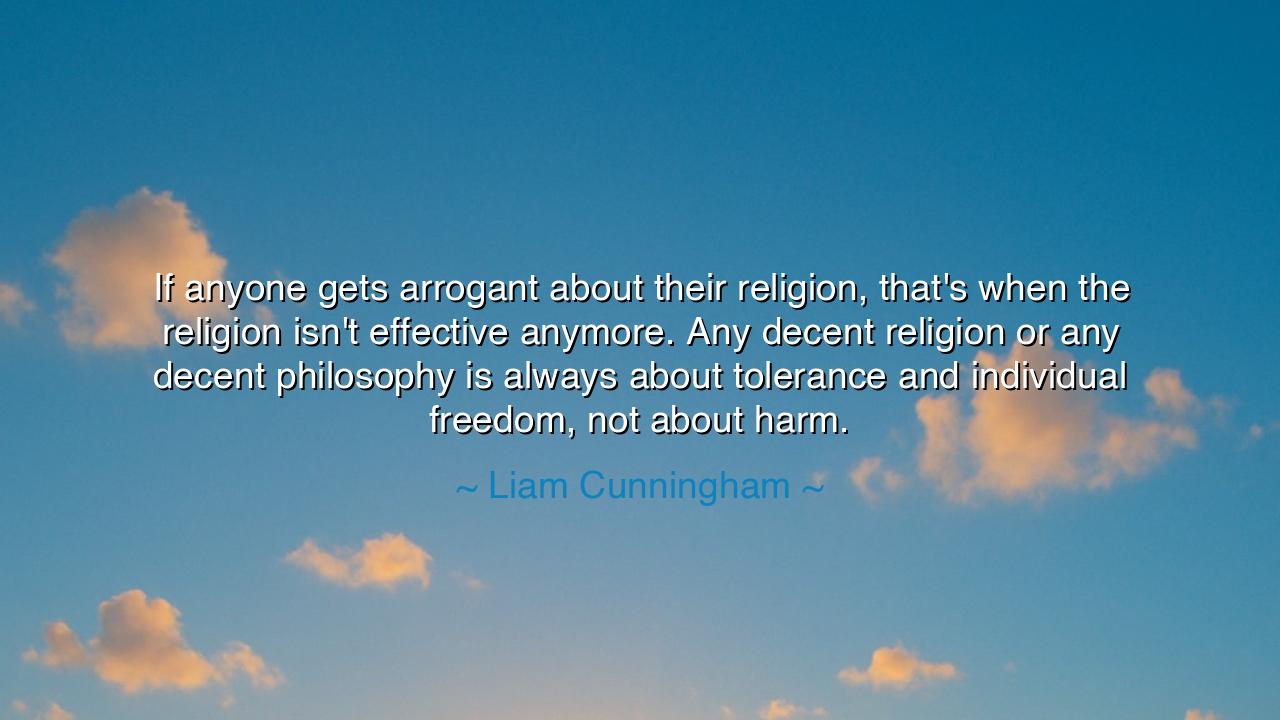
If anyone gets arrogant about their religion, that's when the
If anyone gets arrogant about their religion, that's when the religion isn't effective anymore. Any decent religion or any decent philosophy is always about tolerance and individual freedom, not about harm.






The words of Liam Cunningham—“If anyone gets arrogant about their religion, that’s when the religion isn’t effective anymore. Any decent religion or any decent philosophy is always about tolerance and individual freedom, not about harm.”—resound with the clarity of timeless wisdom. They remind us that the essence of religion and philosophy is not to inflate the pride of man, but to humble him; not to sow division, but to cultivate compassion. For the moment faith becomes a throne for arrogance rather than a fountain of love, it ceases to heal and begins to wound.
The origin of this saying comes from Cunningham’s reflections on faith and humanity, voiced not as a preacher, but as a man who has witnessed both the power and the danger of belief. He is no stranger to the stories of human pride, and here he names the fatal turning point: when humility gives way to superiority. In this insight he captures a truth taught by prophets, philosophers, and sages across the centuries—that tolerance and freedom are the hallmarks of true wisdom, while arrogance and harm are the signs of its corruption.
History provides us with grave examples of this lesson. Consider the Spanish Inquisition, when religion, instead of guiding souls with patience, became a tool of fear and domination. What began as devotion to God was warped into arrogance, leading to persecution, torture, and death. Here we see Cunningham’s warning fulfilled: when religion exalts itself in pride and forgets compassion, it no longer uplifts—it destroys. The faith that once inspired is rendered ineffective, stripped of its essence, and remembered only for its cruelty.
Yet history also gives us brighter witnesses. Mahatma Gandhi, though deeply rooted in his Hindu faith, embraced the truths of all religions. He refused arrogance and chose instead humility, nonviolence, and respect for all. His life demonstrates Cunningham’s vision of a “decent philosophy”—one marked by tolerance and the defense of individual dignity. Gandhi’s strength lay not in claiming superiority for his beliefs, but in drawing upon them to serve justice and peace. Thus, his faith remained effective, because it was lived not as pride, but as service.
The heart of Cunningham’s words lies in this balance: faith and philosophy are meant to guide, to inspire, and to heal. When they lead to arrogance, they betray their purpose. But when they lead to tolerance and freedom, they fulfill it. The measure of any creed is not how loudly its followers proclaim it, but how deeply it enriches their character and how gently it touches the lives of others. If it brings harm, it is hollow; if it brings kindness, it is alive.
The lesson for us is both simple and profound: guard your heart against arrogance, especially in matters of belief. Do not use your faith or philosophy as a weapon to dominate, but as a lamp to guide. Ask not, “How can my belief make me greater than others?” but rather, “How can my belief help me love others more deeply?” For the moment you exalt yourself through faith, you extinguish the very light that faith was meant to give.
Practically, this means cultivating humility in our daily lives. It means listening to those who differ from us, treating their convictions with respect even when we disagree. It means holding our own beliefs firmly, yet with gentleness, refusing to let them become tools of harm. And it means striving to embody tolerance—not as weakness, but as strength, for true tolerance requires courage, patience, and compassion.
Thus, Cunningham’s words endure as a call to vigilance: faith without humility becomes arrogance, and philosophy without compassion becomes harm. But lived with gentleness, tolerance, and respect for freedom, they remain effective guides for the soul. Let us, then, walk in humility, so that our beliefs are not monuments to pride, but living streams of wisdom and love, nourishing the world around us.






AAdministratorAdministrator
Welcome, honored guests. Please leave a comment, we will respond soon